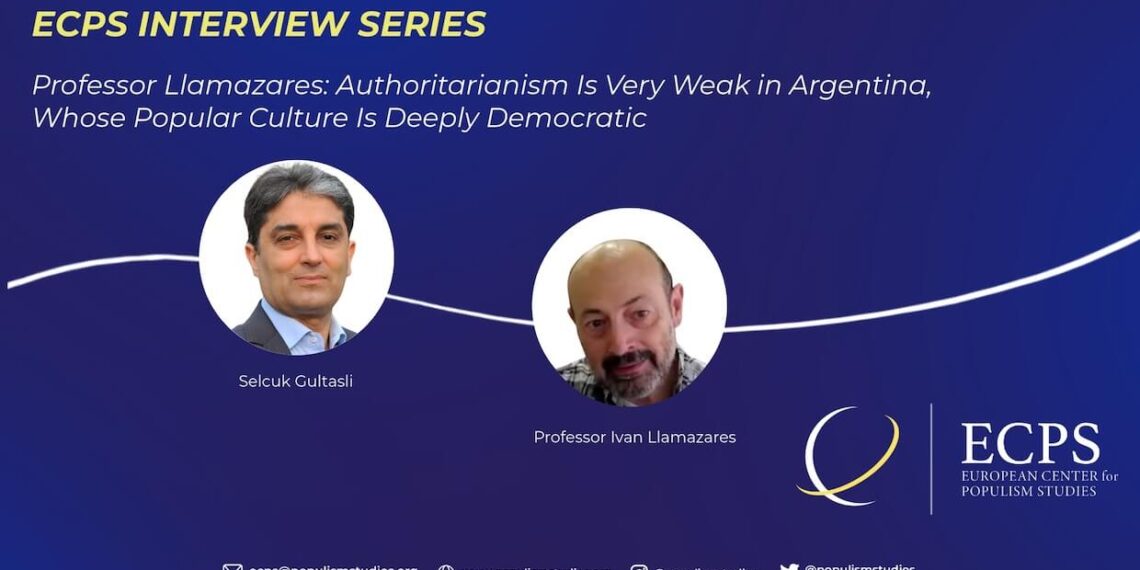In this exclusive interview with the ECPS, Professor Ivan Llamazares of the University of Salamanca analyzes Argentina’s shifting political landscape under President Javier Milei, whose recent midterm victory consolidated his power and emboldened his radical austerity agenda. Professor Llamazares argues that while Milei’s libertarian populism intensifies Argentina’s ideological divisions, it does not fundamentally alter them. “It’s a modification, an intensification—but the underlying structure is still there,” he explains. Rejecting comparisons to Bolsonaro’s authoritarianism, he insists that “authoritarianism is very weak in Argentina, whose popular culture is deeply democratic.” For Professor Llamazares, Milei’s experiment embodies an “extreme illustration” of global right-wing populism—yet remains distinctly Argentine, rooted in enduring social cleavages, economic crises, and democratic resilience.
Interview by Selcuk Gultasli
Argentina’s President Javier Milei has consolidated his grip on power after his party, La Libertad Avanza, won nearly 41% of the vote in the midterm elections, securing 13 of 24 Senate seats and 64 of 127 lower-house seats. The landslide victory marks a major political endorsement of Milei’s radical austerity program, dubbed “chainsaw politics,” defined by deep spending cuts, deregulation, and free-market reforms. The results will allow him to advance his agenda more easily after facing frequent legislative resistance in his first two years in office. Supporters have hailed the win as a rejection of decades of Peronist economic management, while critics warn of deepening poverty, unemployment, and inequality as a result of sweeping cuts to education, healthcare, pensions, and social programs. Despite stabilizing inflation and restoring investor confidence, Milei’s reforms have sparked widespread hardship and a risk of recession. Meanwhile, a record-low turnout of 67.9% reflects rising public apathy and disillusionment with Argentina’s political class.
Against this backdrop of economic turbulence and populist consolidation, Professor Ivan Llamazares, a leading scholar of political science at the University of Salamanca, reflects on the deeper ideological and institutional dynamics shaping Argentina’s political transformation in an exclusive interview with the European Center for Populism Studies (ECPS). Known for his research on ideological structuring and party system dynamics in Latin America, Professor Llamazares situates Milei’s rise within Argentina’s longstanding ideological fault lines—the enduring struggle between Peronist interventionism and neoliberal technocracy.
Professor Llamazares cautions against viewing Milei’s ascent as a structural rupture. “It’s a modification, an intensification,” he explains, “but the underlying structure is still there.” In his view, Mauricio Macri’s victory in 2015 marked a more significant political realignment, introducing a coherent center-right, pro-business coalition that shifted the ideological balance of Argentine politics. Milei, he argues, has merely intensified this trajectory, infusing it with “a new rhetoric, a new style,” and a libertarian flair.
While comparisons to Bolsonaro and Fujimori are unavoidable, Professor Llamazares stresses the limits of authoritarianism in Argentina. “Authoritarianism is very weak… even the authoritarian project itself must be very weak,”he observes. This weakness, he suggests, is rooted in Argentina’s deeply democratic popular culture, shaped by the trauma of the last dictatorship and the political learning processes that culminated in the country’s 1983 democratic restoration. Unlike Bolsonaro, Milei “hasn’t taken significant steps toward building authoritarian institutions.”
At the same time, Professor Llamazares acknowledges that Milei represents “an extreme illustration” of a global populist trend that merges moral populism, economic deregulation, and cultural grievance. Yet, he underscores that many aspects of Milei’s project are “very typically Argentine,” reflecting specific socio-economic tensions—between export-oriented elites and protectionist sectors, between dollarization and social protection, and between a cosmopolitan upper class and the working poor.
Ultimately, Professor Llamazares interprets Milei’s moment not as a new ideological paradigm, but as a cyclical populist insurgency within Argentina’s enduring political structure. “Milei represents something new in style,” he concludes, but the deeper ideological foundations of Argentine politics remain intact.


